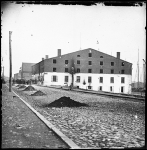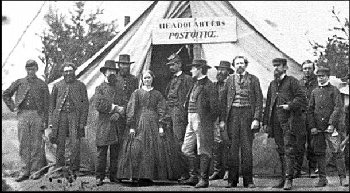
Medal of Honor:
Dr. Mary E. Walker,
Prisoner of War
Civil War - 1865
by: Don Poss
© 1996

(It is a stretch to link this story to the Vietnam War, but it is one I want to tell, so here goes.)
No woman was awarded the Medal of Honor during the Vietnam War. A recent film, Badge of Courage, depicted a female being awarded the MOH in the Gulf War as the first female to receive the MOH. The film was wrong. The next female to be award the Medal of Honor will in fact be the Second to do so. Who was the first? you ask. Dr. Mary E. Walker, M.D., a Civil War physician, was awarded the Congressional Medal of Honor in 1865, upon recommendation of Major General Sherman, and Major General Thomas. [100 years later, I would arrive in Vietnam.]
 Men who remembered the early defeats of the Army of the Potomac in 1861
and 1862, whereas Washington itself became a hospital complex treating
20,000 plus wounded union troops.
Men who remembered the early defeats of the Army of the Potomac in 1861
and 1862, whereas Washington itself became a hospital complex treating
20,000 plus wounded union troops.
Horse-drawn ambulance-trains pressed a never
ending demand for new facilities to convert into hospitals. The military
used public buildings, including one wing of the Patent Office, which
became known as the Patent Office Hospital from 1861 to 1863. 
Field hospitals abounded, in which the most
common surgery was amputation and embalming.  As assistant surgeon, Dr. Mary Walker no doubt experienced her share of
horror at human suffering. When captured, she became a prisoner of war in
a southern prison in Virginia.
As assistant surgeon, Dr. Mary Walker no doubt experienced her share of
horror at human suffering. When captured, she became a prisoner of war in
a southern prison in Virginia.
Dr. Mary Walker's
Medal of Honor was rescinded in 1917, along with 910 others. Today, some
believe her medal was rescinded because of her involvement as a
suffragette. Others, discredit that opinion as 909 medals rescinded were
awarded to males. The stated reason, and credible one, was government's
effort to "... increase the prestige of the grant." 
For whatever reason, former POW Dr. Mary Walker
refused to return the MOH, and wore it until her death in 1919.
Fifty-eight years later, the U.S. Congress posthumously reinstated her
medal, and it was restored by President Carter on June 10, 1977. Today,
Dr. Walker's name is on a plaque in the Pentagon, and she is the only
woman of the Civil War, or any war, known to have been awarded the
Congressional Medal of Honor.
Edwin M. Stanton, Secretary of War,
wrote of Dr. Walker:
She lived a life of determined
unconventionality; being a bloomerite from her younger years, she
preferred to dress in pants. Later on in life, still practicing medicine,
she could be seen wearing men's top hats and top coats as well as pants.
Dr. Mary E. Walker (1832 - 1919)
Given under my hand in the city of Washington, D.C., this 11th day of November, A.D. 1865. Andrew Johnson, President |